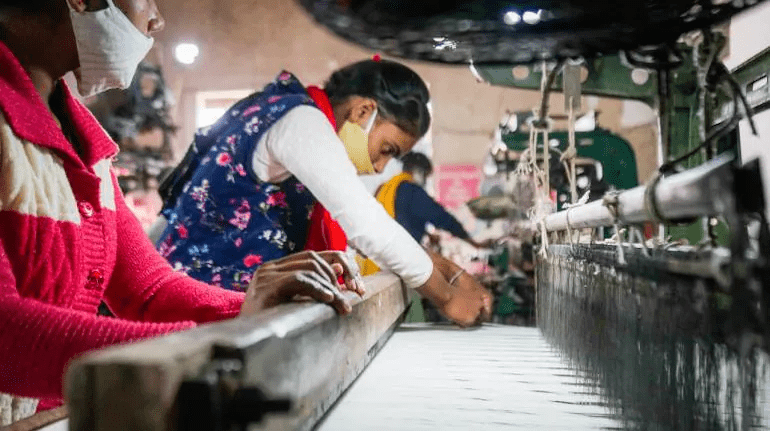Incorporated in 2019, Greenware offers a unique marketplace for the eco-friendly, decentralized textile value chain, while generating livelihoods for rural women by addressing three key issues simultaneously – pollution by the fashion industry (fashion industry is the world’s second-largest polluter), poverty in rural India, and empowerment of rural women who comprise 81.29% of the total female workforce in India.
That realization and the learning came in handy when Abhishek decided to establish Greenware with support from the incubator Indian Institute of Management-Calcutta Innovation Park (IIMCIP) and Villgro Innovations Foundation. Headquartered in Lucknow (Uttar Pradesh), with its manufacturing unit located in Safedabad (Barabanki, Uttar Pradesh), in its first year, Greenware worked with 370 weaving artisans who produced around 2.25 lakh meters of fabric with a turnover of Rs 2.5 crore. The artisans took home approximately Rs 9,000 per month for their engagement with Greenware and as a bonus picked the skill of operating a solar charkha.
“For the artisans, it was a remarkable jump in revenue generation and a commendable decrease in manual labor. In a manual charkha, a woman can spin only 60-100 grams of yarn in the 8-hour day and earn Rs 50-60, while with a solar charkha, the spun yarn can hit the 1-kilogram mark and the wage goes up to Rs 200 a day. Since there is no drudgery in operating solar charkhas, one woman can easily run two machines simultaneously and earn up to Rs 12,000 per month while working from her home,” Abhishek said.
Greenware was started with both the B2B (business to business) and B2C (business to customer) business models. It signed up with buyer partners like W for Women and Aurelia, both leading womenswear retailers of traditional wear, and spread the solar charkha dreams to various locations in Uttar Pradesh and Bihar. In one year, Greenware procured 49,500 kilograms of yarn produced by 590 rural women from Nawada (Bihar) and Varanasi (UP). The yarn was further distributed to various traditional textile clusters: Gaya (Bihar), Bhagalpur (Bihar), Varanasi (UP), Bijnor (UP), and Barabanki (UP), where it was woven by traditional weavers into fabrics.
When the pandemic struck, though, demand for the fabric spiraled downward. Thankfully, amidst the despair, Abhishek found a few messiahs. Greenware was one of six companies selected for the ‘Powering Livelihoods’ program run jointly by the Council On Energy, Environment and Water (CEEW) and Villgro Innovations Foundation. CEEW and Villgro provided the much-needed mentorship as well as technical and financial support to keep it afloat. Renewable energy giant ReNew Power stepped in with its CSR initiative and helped Greenware make masks. In four months, Greenware made five lakh masks with the help of 240 women who were paid Rs 4 per mask. In all, during the pandemic, Greenware has made 15 lakh masks that are sold to government offices as well as retail channels.
“The idea was to make masks that were better substitutes of the surgical masks. On average, a non-biodegradable surgical mask costs Rs 5 while Greenwear’s environment-friendly mask sells for Rs 6,” Abhishek added.
It has been two years since Abhishek set out to become a solar vastra entrepreneur. So far, he has been instrumental in getting 3,500 women from UP, Bihar, Gujarat, and Rajasthan trained in solar charkha skills, out of which 1,180 women got solar charkhas installed in their homes. In the coming years, Greenware plans to enter new market segments like maternity wear, yoga wear, loungewear, kids wear, hospital wear, and hospitality wear. With two retail stores in Lucknow, Greenware is also establishing its retail presence.
“If only 5% of Indian villages become solar charkha clusters (around 30,000), it can produce 180 crore kilograms (18 lakh tonnes) of cotton yarn which is almost 50% of India’s current cotton yarn capacity, and generate livelihood for 1.2 crore people without migrating from their villages,” Abhishek stared at the sun as he repeated his solar dream. A dream not only for himself but for those at the bottom of the economic pyramid.

